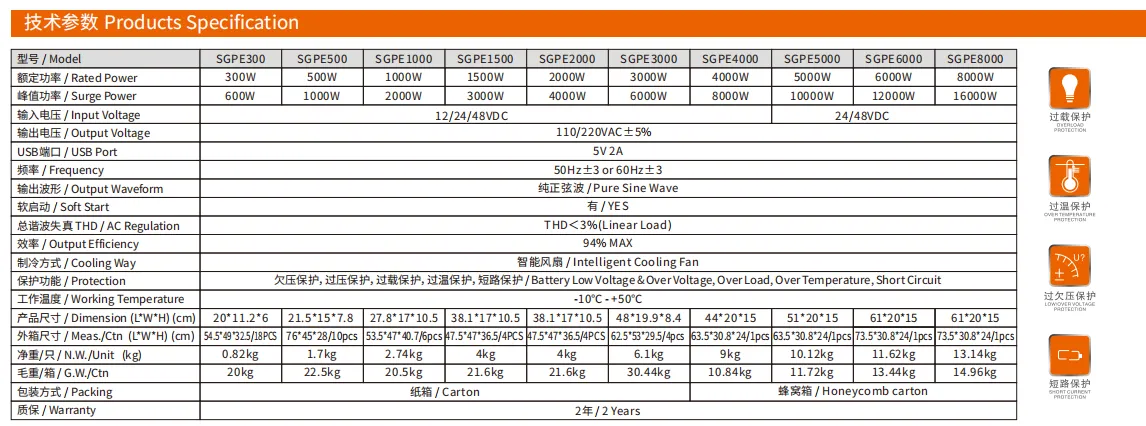Understanding the Benefits and Types of Solar Power Inverters for Your Home
Understanding Solar Power Inverters The Heart of Your Solar System
As the world shifts towards renewable energy, solar power continues to gain prominence as a sustainable and eco-friendly energy source. Central to any solar power system is the solar power inverter, often referred to as the heart of the system. This vital component converts the direct current (DC) generated by solar panels into alternating current (AC), which is used in most home appliances and can be fed into the electrical grid. Understanding how solar inverters work, their types, and their importance can help homeowners and businesses maximize the benefits of solar energy.
How Solar Power Inverters Work
Solar panels collect sunlight and convert it into DC electricity. However, the electricity produced by solar panels cannot be used directly in homes, which typically run on AC electricity. This is where solar inverters come into play. They serve three primary functions
1. Conversion of DC to AC The inverter converts the DC electricity from the solar panels into AC electricity, making it compatible with household appliances and the electrical grid.
2. Monitoring Inverters monitor the performance of the solar power system. They provide real-time data regarding energy production, allowing users to track the efficiency of their system and identify any potential issues.
3. Safety Features Inverters include safety mechanisms to protect the solar power system and the electrical grid. For instance, if there’s a power outage, inverters disconnect from the grid to prevent any back-feed of electricity, which could pose risks to utility workers.
Types of Solar Inverters
There are several types of solar inverters, each suited for different applications and system designs
1. String Inverters This is the most common type of solar inverter. In a string inverter system, multiple solar panels are connected (or strung) together in a series to a single inverter. While they are cost-effective and simple, if one panel in the string is shaded or malfunctions, it can affect the performance of the entire string.
2. Micro-Inverters Unlike string inverters, micro-inverters are installed on each solar panel individually. This allows each panel to operate independently, maximizing energy production, especially in situations with shading. However, micro-inverters can be more expensive than string inverters.
solar power inverter

3. Power Optimizers These devices work in conjunction with string inverters. They are attached to each solar panel and optimize the output before sending it to the string inverter. This helps mitigate the shading issue but still relies on a central inverter for conversion.
4. Hybrid Inverters Hybrid inverters can manage multiple energy sources, such as solar power and battery storage systems. They allow users to both consume solar energy and store excess energy for later use at night or during power outages.
Importance of Solar Inverters
Solar power inverters are crucial for several reasons
- Efficiency The efficiency of a solar power system largely depends on the type and quality of the inverter. A high-quality inverter ensures maximum energy conversion and assists in producing the most electricity possible from the available sunlight.
- System Performance Inverters not only convert electricity but also monitor the system’s performance. They help in troubleshooting issues and optimizing the energy production of solar panels.
- Grid Compliance Many regions require solar inverters to comply with specific grid protocols. A compliant inverter ensures a safe connection to the grid and adheres to local regulations.
- Cost Savings By maximizing energy production and allowing homeowners to utilize solar energy effectively, solar power inverters contribute to significant cost savings on electricity bills.
Conclusion
In a world increasingly reliant on sustainable energy sources, solar power inverters play a pivotal role in harnessing solar energy for everyday use. Their ability to convert and optimize energy from solar panels makes them indispensable for anyone investing in solar technology. Whether you choose a string inverter, micro-inverter, or hybrid inverter, understanding their function and characteristics will empower you to make informed decisions and maximize the benefits of solar energy for your home or business. As technology advances, the future of solar inverters looks promising, paving the way for an even more efficient and sustainable energy landscape.
-
Unlocking Energy Freedom with the Off Grid Solar InverterNewsJun.06,2025
-
Unlock More Solar Power with a High-Efficiency Bifacial Solar PanelNewsJun.06,2025
-
Power Your Future with High-Efficiency Monocrystalline Solar PanelsNewsJun.06,2025
-
Next-Gen Solar Power Starts with Micro Solar InvertersNewsJun.06,2025
-
Harnessing Peak Efficiency with the On Grid Solar InverterNewsJun.06,2025
-
Discover Unmatched Efficiency with the Latest String Solar InverterNewsJun.06,2025







